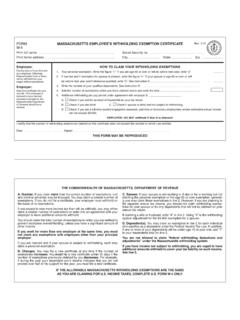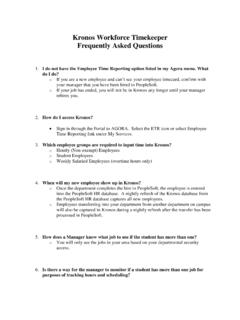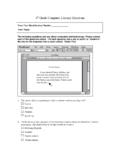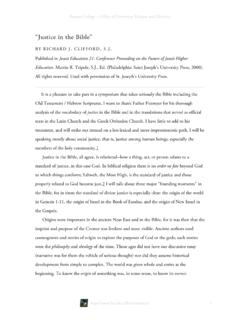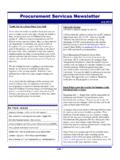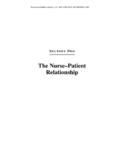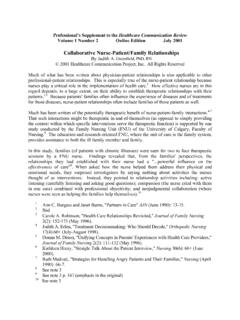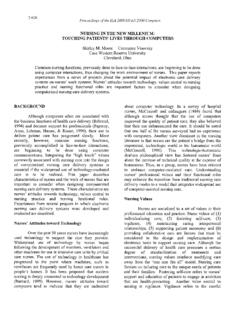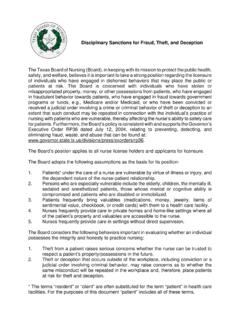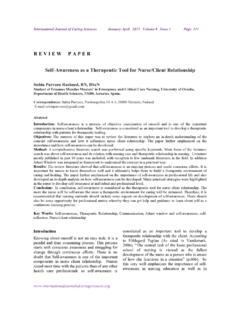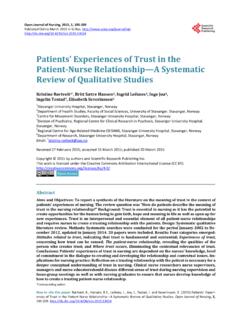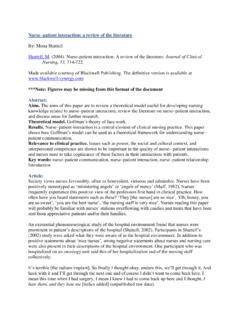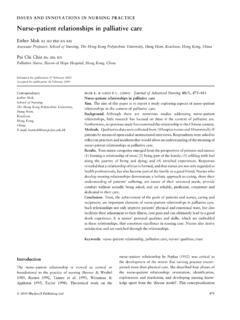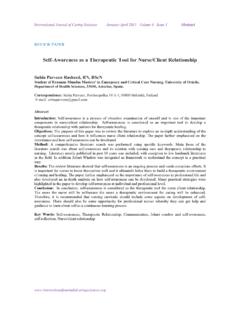Transcription of NursingWorld | Code of Ethics
1 NursingWorld | code of Ethics code of Ethics for Nurses With Interpretive Statements 2001 Approved ProvisionsBack to the code of Ethics page Table of Contents Preface Provision 1. The nurse , in all professional relationships, practices with compassion and respect for the inherent dignity, worth, and uniqueness of every individual, unrestricted by considerations of social or economic status, personal attributes, or the nature of health problems. Respect for human dignity Relationships to patients The nature of health problems The right to self-determination Relationships with colleagues and others Provision 2. The nurse 's primary commitment is to the patient, whether an individual, family, group, or Primacy of the patient's interests Conflict of interest for nurses Collaboration Professional boundaries Provision 3.
2 The nurse promotes, advocates for, and strives to protect the health, safety, and rights of the Privacy Confidentiality Protection of participants in research Standards and review mechanisms Acting on questionable practice Addressing impaired practice Provision 4. The nurse is responsible and accountable for individual nursing practice and determines the appropriate delegation of tasks consistent with the nurse 's obligation to provide optimum patient Acceptance of accountability and responsibility Accountability for nursing judgment and action Responsibility for nursing judgment and action Delegation of nursing activities Provision 5.
3 The nurse owes the same duties to self as to others, including the responsibility to preserve integrity and safety, to maintain competence, and to continue personal and professional Moral self-respect file:///I|/STATHOME/WEBPAGE/ Ethics / (1 of 14) [11/15/2010 3:15:58 PM] NursingWorld | code of Professional growth and maintenance of competence Wholeness of character Preservation of integrity Provision 6. The nurse participates in establishing, maintaining, and improving health care environments and conditions of employment conducive to the provision of quality health care and consistent with the values of the profession through individual and collective Influence of the environment on moral virtues and values Influence of the environment on ethical obligations Responsibility for the health care environment Provision 7.
4 The nurse participates in the advancement of the profession through contributions to practice, education, administration, and knowledge Advancing the profession through active involvement in nursing and in health care policy Advancing the profession by developing, maintaining, and implementing professional standards in clinical, administrative, and educational practice Advancing the profession through knowledge development, dissemination, and application to practice Provision 8. The nurse collaborates with other health professionals and the public in promoting community, national, and international efforts to meet health Health needs and concerns Responsibilities to the public Provision 9.
5 The profession of nursing, as represented by associations and their members, is responsible for articulating nursing values, for maintaining the integrity of the profession and its practice, and for shaping social Assertion of values The profession carries out its collective responsibility through professional associations Intraprofessional integrity Social reform PrefaceEthics is an integral part of the foundation of nursing. Nursing has a distinguished history of concern for the welfare of the sick, injured, and vulnerable and for social justice. This concern is embodied in the provision of nursing care to individuals and the community.
6 Nursing encompasses the prevention of illness, the alleviation of suffering, and the protection, promotion, and restoration of health in the care of individuals, families, groups, and communities. Nurses act to change those aspects of social structures that detract from health and well-being. Individuals who become nurses are expected not only to adhere to the ideals and moral norms of the profession but also to embrace them as a part of what it means to be a nurse . The ethical tradition of nursing is self-reflective, enduring, and distinctive. A code of Ethics makes explicit the primary goals, values, and obligations of the code of Ethics for Nurses serves the following purposes: It is a succinct statement of the ethical obligations and duties of every individual who enters the nursing profession.
7 File:///I|/STATHOME/WEBPAGE/ Ethics / (2 of 14) [11/15/2010 3:15:58 PM] NursingWorld | code of Ethics It is the profession's nonnegotiable ethical standard. It is an expression of nursing's own understanding of its commitment to society. There are numerous approaches for addressing Ethics ; these include adopting or subscribing to ethical theories, including humanist,feminist, and social Ethics , adhering to ethical principles, and cultivating virtues. The code of Ethics for Nurses reflects all of these approaches. The words "ethical" and "moral" are used throughout the code of Ethics . "Ethical" is used to refer to reasons for decisions about how one ought to act, using the above mentioned approaches.
8 In general, the word "moral" overlaps with "ethical" but is more aligned with personal belief and cultural values. Statements that describe activities and attributes of nurses in this code of Ethics are to be understood as normative or prescriptive statements expressing expectations of ethical code of Ethics for Nurses uses the term patient to refer to recipients of nursing care. The derivation of this word refers to "one who suffers," reflecting a universal aspect of human existence. Nonetheless, it is recognized that nurses also provide services to those seeking health as well as those responding to illness, to students and to staff, in health care facilities as well as in communities.
9 Similarly, the termpracticerefers to the actions of the nurse in whatever role the nurse fulfills, including direct patient care provider, educator, administrator, researcher, policy developer, or other. Thus, the values and obligations expressed in this code of Ethics apply to nurses in all roles and code of Ethics for Nurses is a dynamic document. As nursing and its social context change, changes to the code of Ethics are also necessary. The code of Ethics consists of two components: the provisions and the accompanying interpretive statements. There are nine provisions. The first three describe the most fundamental values and commitments of the nurse ; the next three address boundaries of duty and loyalty, and the last three address aspects of duties beyond individual patient encounters.
10 For each provision, there are interpretive statements that provide greater specificity for practice and are responsive to the contemporary context of nursing. Consequently, the interpretive statements are subject to more frequent revision than are the provisions. Additional ethical guidance and detail can be found in ANA or constituent member association position statements that address clinical, research, administrative, educational, or public policy code of Ethics for Nurses with Interpretive Statements provides a framework for nurses to use in ethical analysis and decision-making. The code of Ethics establishes the ethical standard for the profession.
